2011版初中英语新课标同步授课课件:unit 4 grammar(译林牛津版九上)
文档属性
| 名称 | 2011版初中英语新课标同步授课课件:unit 4 grammar(译林牛津版九上) | 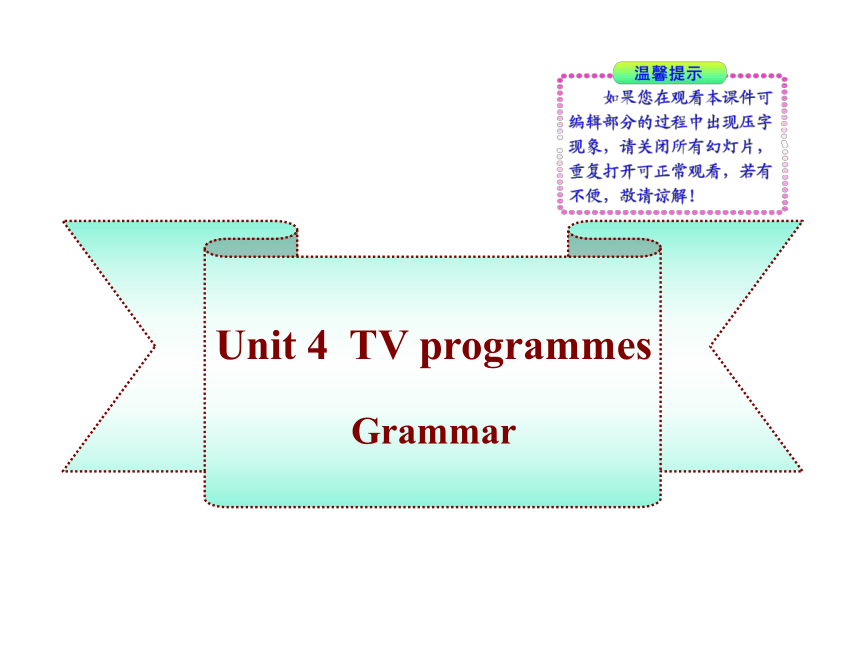 | |
| 格式 | rar | ||
| 文件大小 | 2.0MB | ||
| 资源类型 | 教案 | ||
| 版本资源 | 牛津译林版 | ||
| 科目 | 英语 | ||
| 更新时间 | 2011-11-08 08:09:56 | ||
图片预览

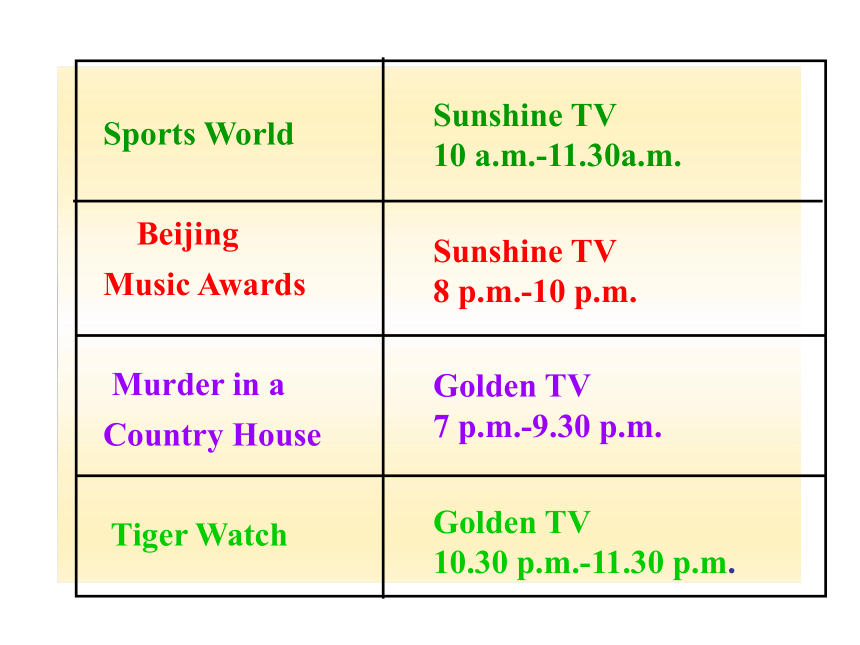
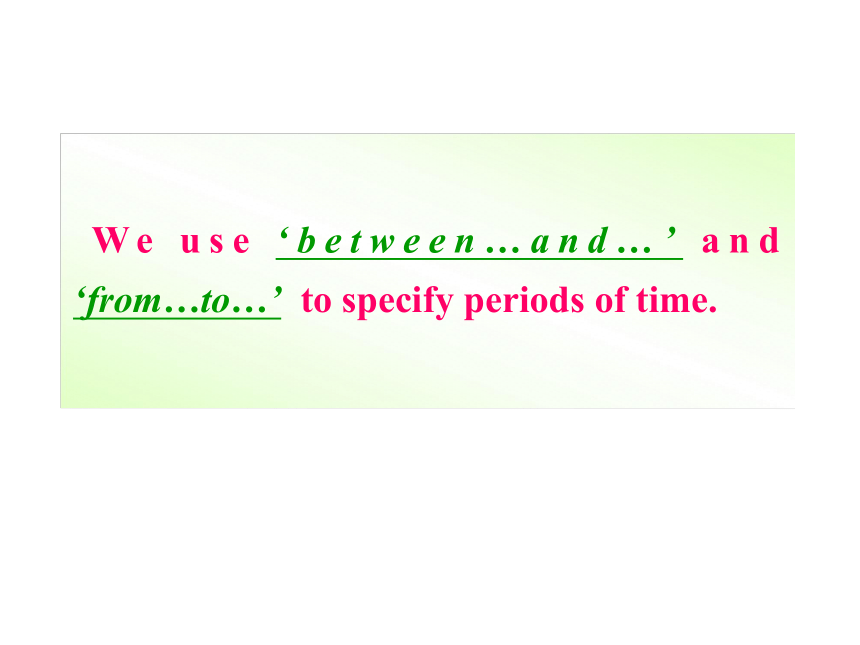
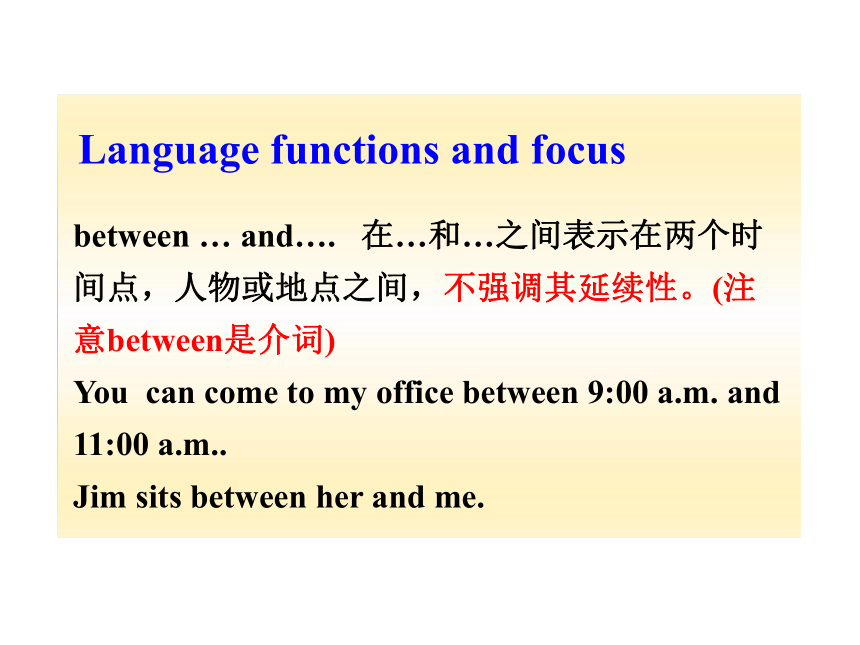
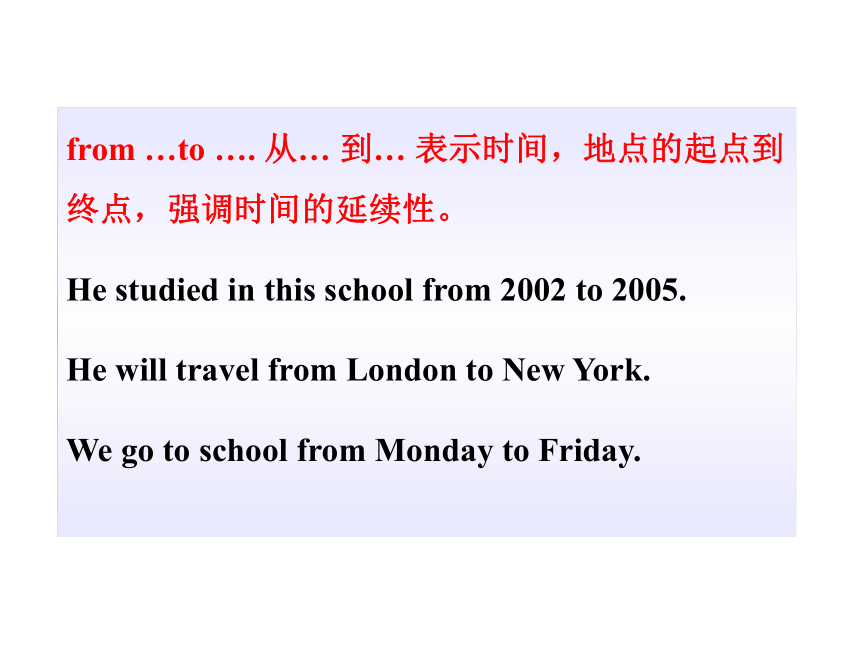
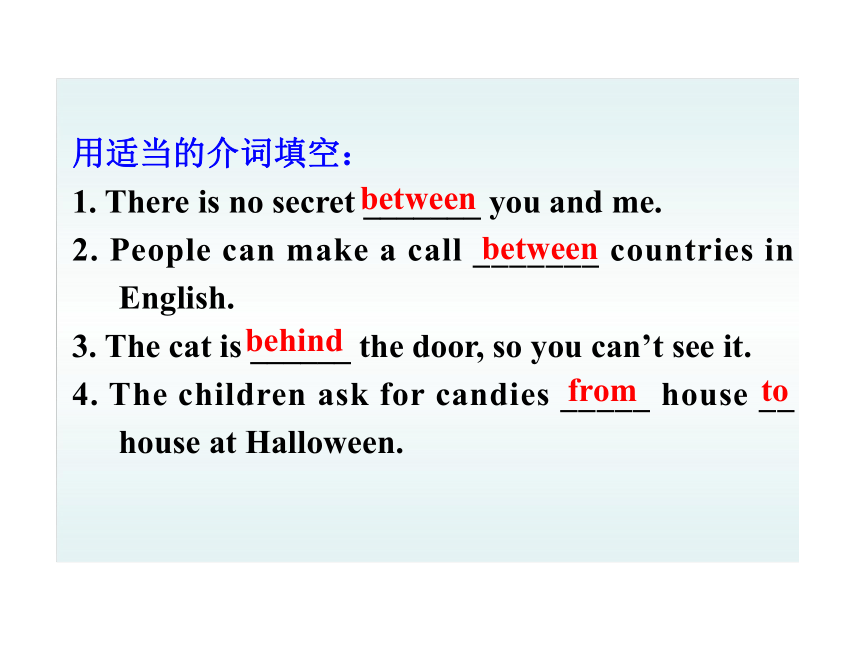
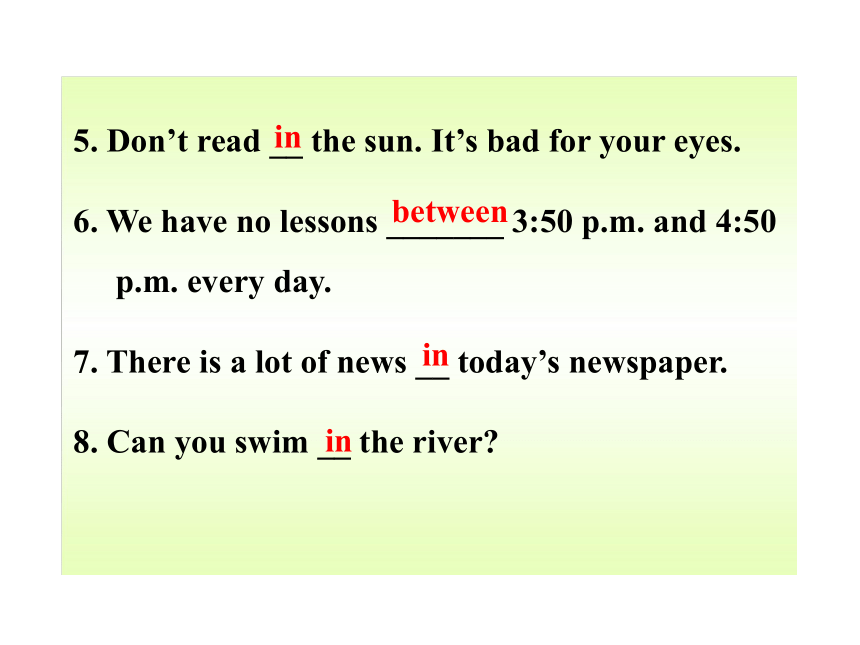
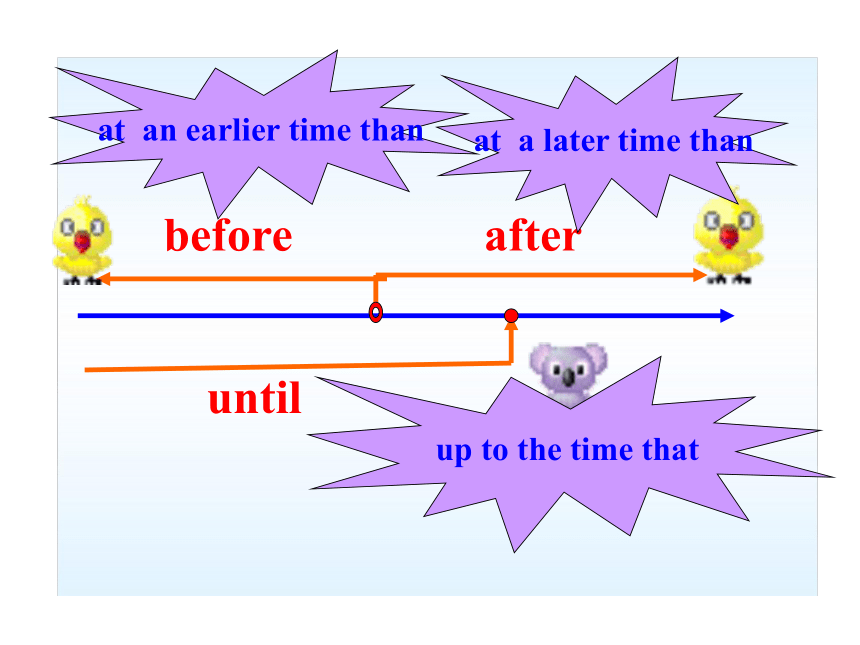
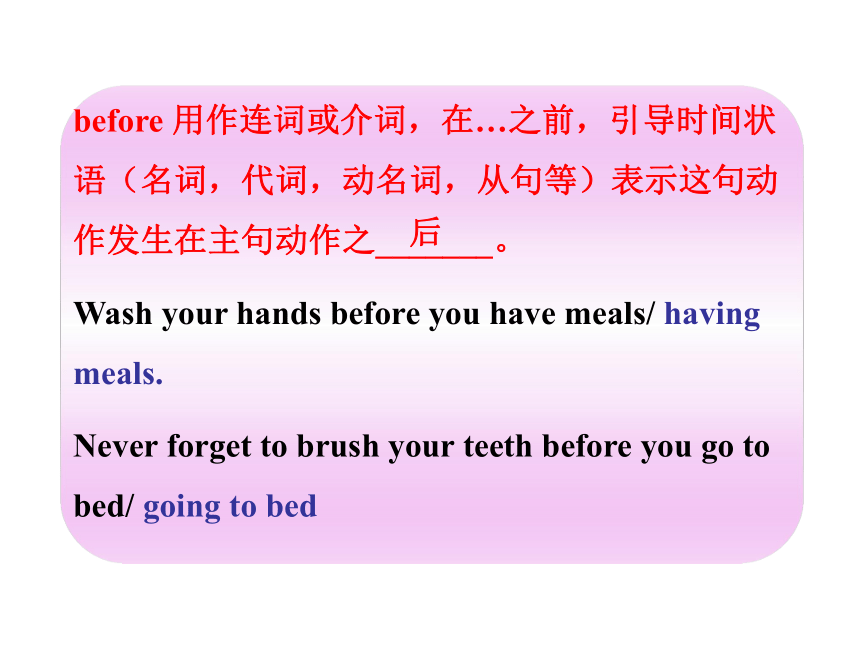
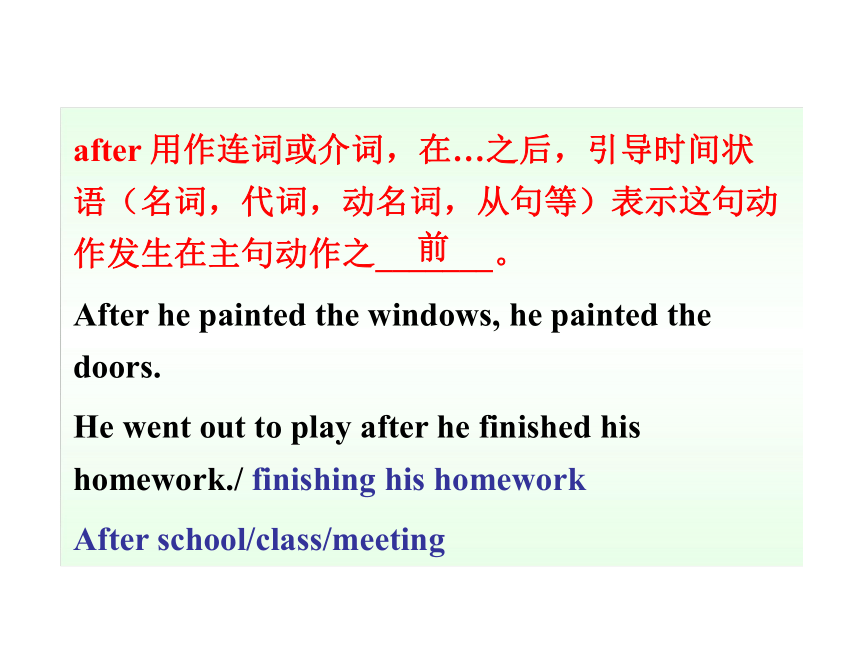
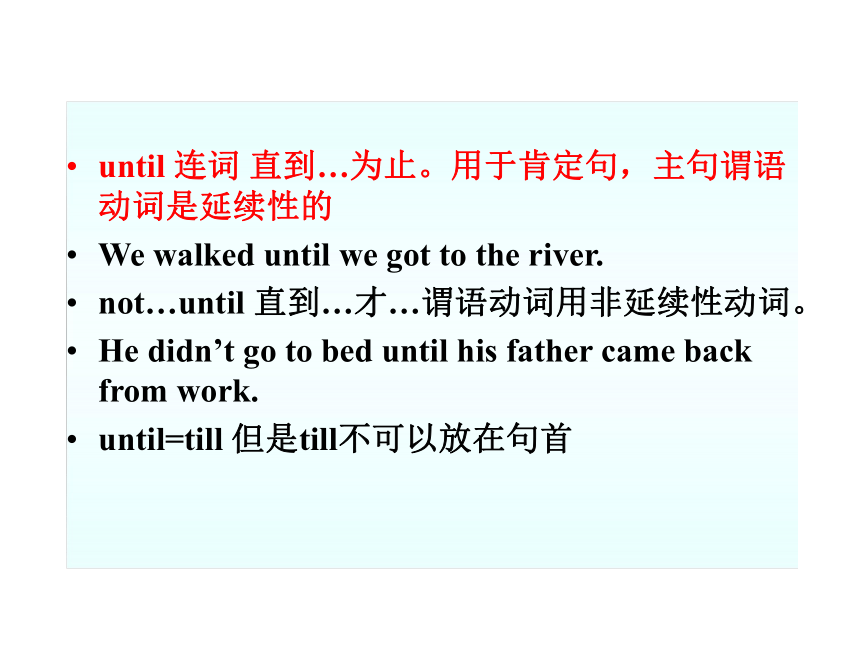
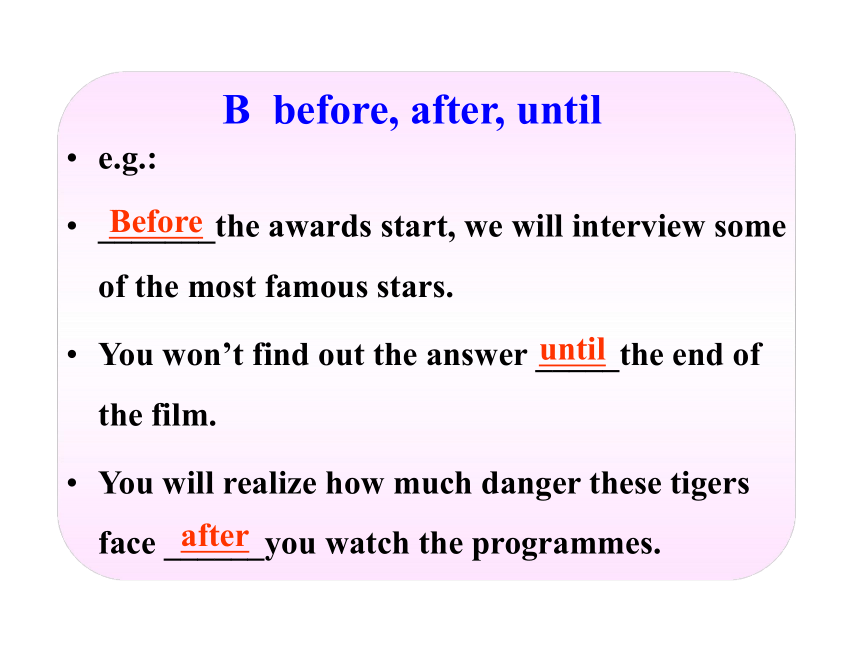
文档简介
(共41张PPT)
Unit 4 TV programmes
Grammar
Sports World
Beijing
Music Awards
Murder in a
Country House
Tiger Watch
Sunshine TV
10 a.m.-11.30a.m.
Sunshine TV
8 p.m.-10 p.m.
Golden TV
7 p.m.-9.30 p.m.
Golden TV
10.30 p.m.-11.30 p.m.
We use ‘between…and…’ and ‘from…to…’ to specify periods of time.
between … and…. 在…和…之间表示在两个时间点,人物或地点之间,不强调其延续性。(注意between是介词)
You can come to my office between 9:00 a.m. and 11:00 a.m..
Jim sits between her and me.
Language functions and focus
from …to …. 从… 到… 表示时间,地点的起点到终点,强调时间的延续性。
He studied in this school from 2002 to 2005.
He will travel from London to New York.
We go to school from Monday to Friday.
用适当的介词填空:
1. There is no secret _______ you and me.
2. People can make a call _______ countries in English.
3. The cat is ______ the door, so you can’t see it.
4. The children ask for candies _____ house __ house at Halloween.
between
between
behind
from
to
5. Don’t read __ the sun. It’s bad for your eyes.
6. We have no lessons _______ 3:50 p.m. and 4:50 p.m. every day.
7. There is a lot of news __ today’s newspaper.
8. Can you swim __ the river
in
between
in
in
after
until
before
at an earlier time than
at a later time than
up to the time that
后
before 用作连词或介词,在…之前,引导时间状语(名词,代词,动名词,从句等)表示这句动作发生在主句动作之_______。
Wash your hands before you have meals/ having meals.
Never forget to brush your teeth before you go to bed/ going to bed
前
after 用作连词或介词,在…之后,引导时间状语(名词,代词,动名词,从句等)表示这句动作发生在主句动作之_______。
After he painted the windows, he painted the doors.
He went out to play after he finished his homework./ finishing his homework
After school/class/meeting
until 连词 直到…为止。用于肯定句,主句谓语动词是延续性的
We walked until we got to the river.
not…until 直到…才…谓语动词用非延续性动词。
He didn’t go to bed until his father came back from work.
until=till 但是till不可以放在句首
B before, after, until
e.g.:
_______the awards start, we will interview some of the most famous stars.
You won’t find out the answer _____the end of the film.
You will realize how much danger these tigers face ______you watch the programmes.
Before
until
after
from… to between…and before when if after until
I won’t go to bed ____ my mother comes back.
2. He could swim _____ he was five years old.
Exercises
until
when
3. You may come to my office ________ 9:00 a.m. ____ 11:30 a.m. tomorrow.
4. We go to school _____ Monday ___ Saturday.
5. Tom will go skating with us __ he has time.
6. The train had already left ______ we got to the station.
from
to
if
before
between
and
我们一直走到河边为止。
2. 吃饭前先洗手。
Translate the following sentences:
We walked until we got to the river.
Wash your hands before you have meals.
3. 在他油漆了窗户之后,开始油漆门。
4. 他到十岁才会游泳。
5. 他在过马路前向两边看了看。
After he painted the windows, he painted the doors.
He couldn’t swim until he was ten.
He looked both ways/sides before he crossed the road.
Use ‘while’ and ‘as’ to talk about
when things happen.
Language functions and focus
Long action
while
long action
Shorter action
while
long action
Shorter action
as
long action
Shorter action
as
shorter action
while, as
这两个连词都可引导时间状语从句,但用法有所不同。
当某事正在进行的时候,又发生了另 一件事。While, as 都可用来引导表示 “背景”的时间状语从句。
As/While I was walking down the street I noticed a police car.
2) 当两个长动作同时进行的时候, 常用的是while。
While mother was cooking lunch, I was doing my homework.
3) 当两个动作都表示发展变化的情况时,最常用的是as。
As children get older, they become more and more interested in things around them.
4) 当两个短动作同时发生时,或表示“一边……一边……”时,最常用as。
Just as he caught the fly, he gave a loud cry.
As the teacher came in, we all stopped talking.
C while, as
e.g.:
________ you are watching the awards, write down your answer and send text messages to 1396.
________Millie was watching TV, Eddie was sleeping.
________Millie was watching TV, Andy opened the door.
________Millie was walking past the bookshop, she suddenly thought of buying a TV set.
______ I sat down on sofa, Andy came into the room.
While/As
While
While/As
While/As
As
1. 我父亲在看电视时睡着了。
My father fell asleep while/as he was reading the newspaper.
2. 妈妈做饭的时候,我在做作业。
While Mum was cooking dinner, I was doing my homework.
Translate the following sentences:
3. 我到家的时候, 他正在吃晚饭。
While/As I got home, he was having supper.
4. 她沿着那条路走着, 心里想着她父亲。
As she walked along the road, she thought about her father.
词尾变化 原级 比较级 最高级
单音节词在词尾加-er(比较级)或-est(最高级);以字母e接尾的词加-r或-st hard high fast
Rules
harder higher faster
hardest highest fastest
词尾变化 原级 比较级 最高级
多音节词和多数双音节词在其前面加more 和most slowly carefully
quickly
more slowly
more carefully
more quickly
most slowly
most carefully
most quickly
词尾变化 原级 比较级 最高级
不规则
变化 well /good
much/many
little
badly/ill/bad
far
old
early-earlier-earliest
better more less
worse farther
older /elder
best
most
least
worst
Farthest
older/
elder
副词的比较级和最高级的常用结构.
as+副词原级+as 意为“与… …一样”,表示同级比较
她歌唱得像天使一样甜.
She sings as sweetly as an angel.
2. 我能一小时跑30英里.
I can run as fast as 30 miles an hour.
3. 他在测试中没有Mary做的好.
He doesn’t do so/as well in the test as Mary does.
副词比较级+than 意为“比….更”, 表示两者之间的比较
1. 本比他那个懒爸爸起床早.
Ben gets up earlier than his lazy father.
2. 他们现在比以前过的更幸福.
They now live more happily than before.
4. 一个和三个及三个以上的比较级用法
比较级 + than + any other + 名词单数
比较级 + than + the other + 名词复数
e.g.: Tony is the tallest in our class.
Tony is __________ any other student /the other students in our class。
taller than
雨下得越来越大.
It rained more and more heavily.
2. 你学习越来越努力了.
You study harder and harder.
副词比较级+副词比较级, 意为“越来越……”
The+ 副词的比较级, the+副词的比较级, 意为“越…就越…”
我看到她越多, 我越不喜欢她.
The more I see her, the less I like her.
他打字打得越快, 他出的错就越多.
The faster he types, the more mistakes he will make.
(the+)副词的最高级+比较范围(三者或三者以上), 意为“最……”
亨利是所有运动员中跳的最高的.
Henry jumps highest of all the players.
他在班上学习最用功.
He works hardest in his class.
5.常修饰比较级的词: much, far, a little, still, even
1. ____she came to visit the Greens, they were having supper.
A. As B. Until C. When D. While
2. ---Your pictures are wonderful!
---I had worked for five hours _____ I finished it.
A. when B. before C. while D. after
3. Would you please say it ______ I still can’t follow you.
A. slowly B. more slowly
C. more loudly D. loudly
4. ----Sorry, I’m late, Jack. Can you tell me about the beginning for the film
----I’d like to, but when I got to the cinema the film _____for five minutes.
A. had begun B. had been on
C. has been on D. has begun
用所给词的正确形式填空:
1. She sang even _____ (bad) than usual.
2. Mother asked her son to walk a bit _____ (fast).
3. Of all the novels I like this one ____ (well).
4. Who do you think can jump _______ (high) in your class
worse
faster
best
highest
5. Please send us the e-mail as ______ (quick) as possible.
6. He should speak ____ (little) and listen _____ (much).
7. Please tell them not to play so ______ (noisy).
quickly
less
more
noisily
between from before after until while as
1. _____ I saw the kangaroo, I never knew an animal can jump so high.
2. I’ll play badminton with you ____ I finished my homework.
3. We must finish it _______ 8:00p.m. and 11:00p.m. Come on! We don’t have much time.
Until
after
between
4. You should knock on the door _____ you come in.
5. Can you watch TV _____ 8:00a.m. to 9:30a.m.
6. ____ the tiger came, all the animals ran away.
7. How can you know the ending ______ you read the book
before
from
As
before
8. Can I stay ____ the weekend
9. ________ I was doing my homework, I heard a strange noise downstairs.
10. Sandy was reading the newspaper, _____ Millie was watching TV.
until
While/As
while
Unit 4 TV programmes
Grammar
Sports World
Beijing
Music Awards
Murder in a
Country House
Tiger Watch
Sunshine TV
10 a.m.-11.30a.m.
Sunshine TV
8 p.m.-10 p.m.
Golden TV
7 p.m.-9.30 p.m.
Golden TV
10.30 p.m.-11.30 p.m.
We use ‘between…and…’ and ‘from…to…’ to specify periods of time.
between … and…. 在…和…之间表示在两个时间点,人物或地点之间,不强调其延续性。(注意between是介词)
You can come to my office between 9:00 a.m. and 11:00 a.m..
Jim sits between her and me.
Language functions and focus
from …to …. 从… 到… 表示时间,地点的起点到终点,强调时间的延续性。
He studied in this school from 2002 to 2005.
He will travel from London to New York.
We go to school from Monday to Friday.
用适当的介词填空:
1. There is no secret _______ you and me.
2. People can make a call _______ countries in English.
3. The cat is ______ the door, so you can’t see it.
4. The children ask for candies _____ house __ house at Halloween.
between
between
behind
from
to
5. Don’t read __ the sun. It’s bad for your eyes.
6. We have no lessons _______ 3:50 p.m. and 4:50 p.m. every day.
7. There is a lot of news __ today’s newspaper.
8. Can you swim __ the river
in
between
in
in
after
until
before
at an earlier time than
at a later time than
up to the time that
后
before 用作连词或介词,在…之前,引导时间状语(名词,代词,动名词,从句等)表示这句动作发生在主句动作之_______。
Wash your hands before you have meals/ having meals.
Never forget to brush your teeth before you go to bed/ going to bed
前
after 用作连词或介词,在…之后,引导时间状语(名词,代词,动名词,从句等)表示这句动作发生在主句动作之_______。
After he painted the windows, he painted the doors.
He went out to play after he finished his homework./ finishing his homework
After school/class/meeting
until 连词 直到…为止。用于肯定句,主句谓语动词是延续性的
We walked until we got to the river.
not…until 直到…才…谓语动词用非延续性动词。
He didn’t go to bed until his father came back from work.
until=till 但是till不可以放在句首
B before, after, until
e.g.:
_______the awards start, we will interview some of the most famous stars.
You won’t find out the answer _____the end of the film.
You will realize how much danger these tigers face ______you watch the programmes.
Before
until
after
from… to between…and before when if after until
I won’t go to bed ____ my mother comes back.
2. He could swim _____ he was five years old.
Exercises
until
when
3. You may come to my office ________ 9:00 a.m. ____ 11:30 a.m. tomorrow.
4. We go to school _____ Monday ___ Saturday.
5. Tom will go skating with us __ he has time.
6. The train had already left ______ we got to the station.
from
to
if
before
between
and
我们一直走到河边为止。
2. 吃饭前先洗手。
Translate the following sentences:
We walked until we got to the river.
Wash your hands before you have meals.
3. 在他油漆了窗户之后,开始油漆门。
4. 他到十岁才会游泳。
5. 他在过马路前向两边看了看。
After he painted the windows, he painted the doors.
He couldn’t swim until he was ten.
He looked both ways/sides before he crossed the road.
Use ‘while’ and ‘as’ to talk about
when things happen.
Language functions and focus
Long action
while
long action
Shorter action
while
long action
Shorter action
as
long action
Shorter action
as
shorter action
while, as
这两个连词都可引导时间状语从句,但用法有所不同。
当某事正在进行的时候,又发生了另 一件事。While, as 都可用来引导表示 “背景”的时间状语从句。
As/While I was walking down the street I noticed a police car.
2) 当两个长动作同时进行的时候, 常用的是while。
While mother was cooking lunch, I was doing my homework.
3) 当两个动作都表示发展变化的情况时,最常用的是as。
As children get older, they become more and more interested in things around them.
4) 当两个短动作同时发生时,或表示“一边……一边……”时,最常用as。
Just as he caught the fly, he gave a loud cry.
As the teacher came in, we all stopped talking.
C while, as
e.g.:
________ you are watching the awards, write down your answer and send text messages to 1396.
________Millie was watching TV, Eddie was sleeping.
________Millie was watching TV, Andy opened the door.
________Millie was walking past the bookshop, she suddenly thought of buying a TV set.
______ I sat down on sofa, Andy came into the room.
While/As
While
While/As
While/As
As
1. 我父亲在看电视时睡着了。
My father fell asleep while/as he was reading the newspaper.
2. 妈妈做饭的时候,我在做作业。
While Mum was cooking dinner, I was doing my homework.
Translate the following sentences:
3. 我到家的时候, 他正在吃晚饭。
While/As I got home, he was having supper.
4. 她沿着那条路走着, 心里想着她父亲。
As she walked along the road, she thought about her father.
词尾变化 原级 比较级 最高级
单音节词在词尾加-er(比较级)或-est(最高级);以字母e接尾的词加-r或-st hard high fast
Rules
harder higher faster
hardest highest fastest
词尾变化 原级 比较级 最高级
多音节词和多数双音节词在其前面加more 和most slowly carefully
quickly
more slowly
more carefully
more quickly
most slowly
most carefully
most quickly
词尾变化 原级 比较级 最高级
不规则
变化 well /good
much/many
little
badly/ill/bad
far
old
early-earlier-earliest
better more less
worse farther
older /elder
best
most
least
worst
Farthest
older/
elder
副词的比较级和最高级的常用结构.
as+副词原级+as 意为“与… …一样”,表示同级比较
她歌唱得像天使一样甜.
She sings as sweetly as an angel.
2. 我能一小时跑30英里.
I can run as fast as 30 miles an hour.
3. 他在测试中没有Mary做的好.
He doesn’t do so/as well in the test as Mary does.
副词比较级+than 意为“比….更”, 表示两者之间的比较
1. 本比他那个懒爸爸起床早.
Ben gets up earlier than his lazy father.
2. 他们现在比以前过的更幸福.
They now live more happily than before.
4. 一个和三个及三个以上的比较级用法
比较级 + than + any other + 名词单数
比较级 + than + the other + 名词复数
e.g.: Tony is the tallest in our class.
Tony is __________ any other student /the other students in our class。
taller than
雨下得越来越大.
It rained more and more heavily.
2. 你学习越来越努力了.
You study harder and harder.
副词比较级+副词比较级, 意为“越来越……”
The+ 副词的比较级, the+副词的比较级, 意为“越…就越…”
我看到她越多, 我越不喜欢她.
The more I see her, the less I like her.
他打字打得越快, 他出的错就越多.
The faster he types, the more mistakes he will make.
(the+)副词的最高级+比较范围(三者或三者以上), 意为“最……”
亨利是所有运动员中跳的最高的.
Henry jumps highest of all the players.
他在班上学习最用功.
He works hardest in his class.
5.常修饰比较级的词: much, far, a little, still, even
1. ____she came to visit the Greens, they were having supper.
A. As B. Until C. When D. While
2. ---Your pictures are wonderful!
---I had worked for five hours _____ I finished it.
A. when B. before C. while D. after
3. Would you please say it ______ I still can’t follow you.
A. slowly B. more slowly
C. more loudly D. loudly
4. ----Sorry, I’m late, Jack. Can you tell me about the beginning for the film
----I’d like to, but when I got to the cinema the film _____for five minutes.
A. had begun B. had been on
C. has been on D. has begun
用所给词的正确形式填空:
1. She sang even _____ (bad) than usual.
2. Mother asked her son to walk a bit _____ (fast).
3. Of all the novels I like this one ____ (well).
4. Who do you think can jump _______ (high) in your class
worse
faster
best
highest
5. Please send us the e-mail as ______ (quick) as possible.
6. He should speak ____ (little) and listen _____ (much).
7. Please tell them not to play so ______ (noisy).
quickly
less
more
noisily
between from before after until while as
1. _____ I saw the kangaroo, I never knew an animal can jump so high.
2. I’ll play badminton with you ____ I finished my homework.
3. We must finish it _______ 8:00p.m. and 11:00p.m. Come on! We don’t have much time.
Until
after
between
4. You should knock on the door _____ you come in.
5. Can you watch TV _____ 8:00a.m. to 9:30a.m.
6. ____ the tiger came, all the animals ran away.
7. How can you know the ending ______ you read the book
before
from
As
before
8. Can I stay ____ the weekend
9. ________ I was doing my homework, I heard a strange noise downstairs.
10. Sandy was reading the newspaper, _____ Millie was watching TV.
until
While/As
while
